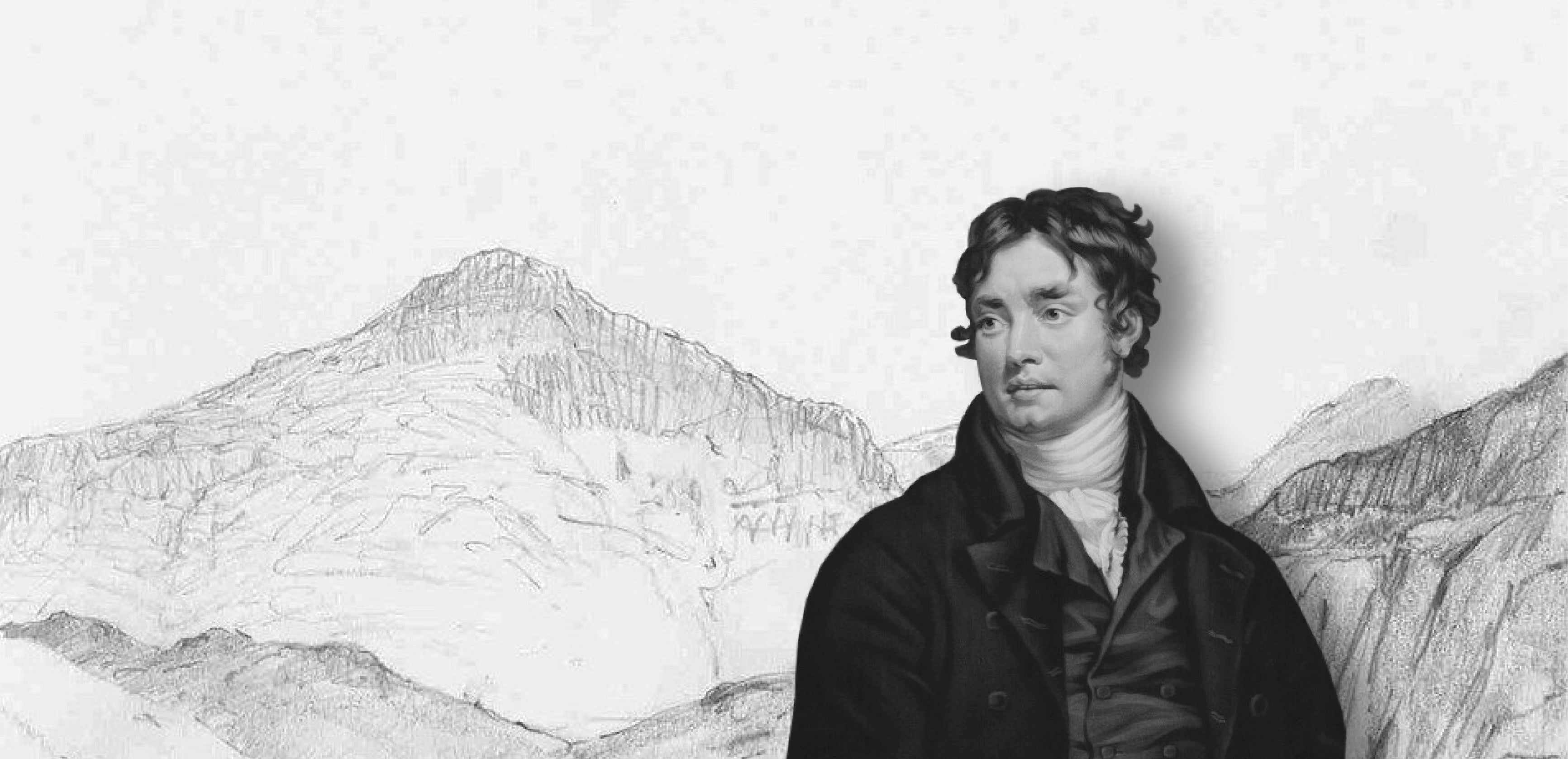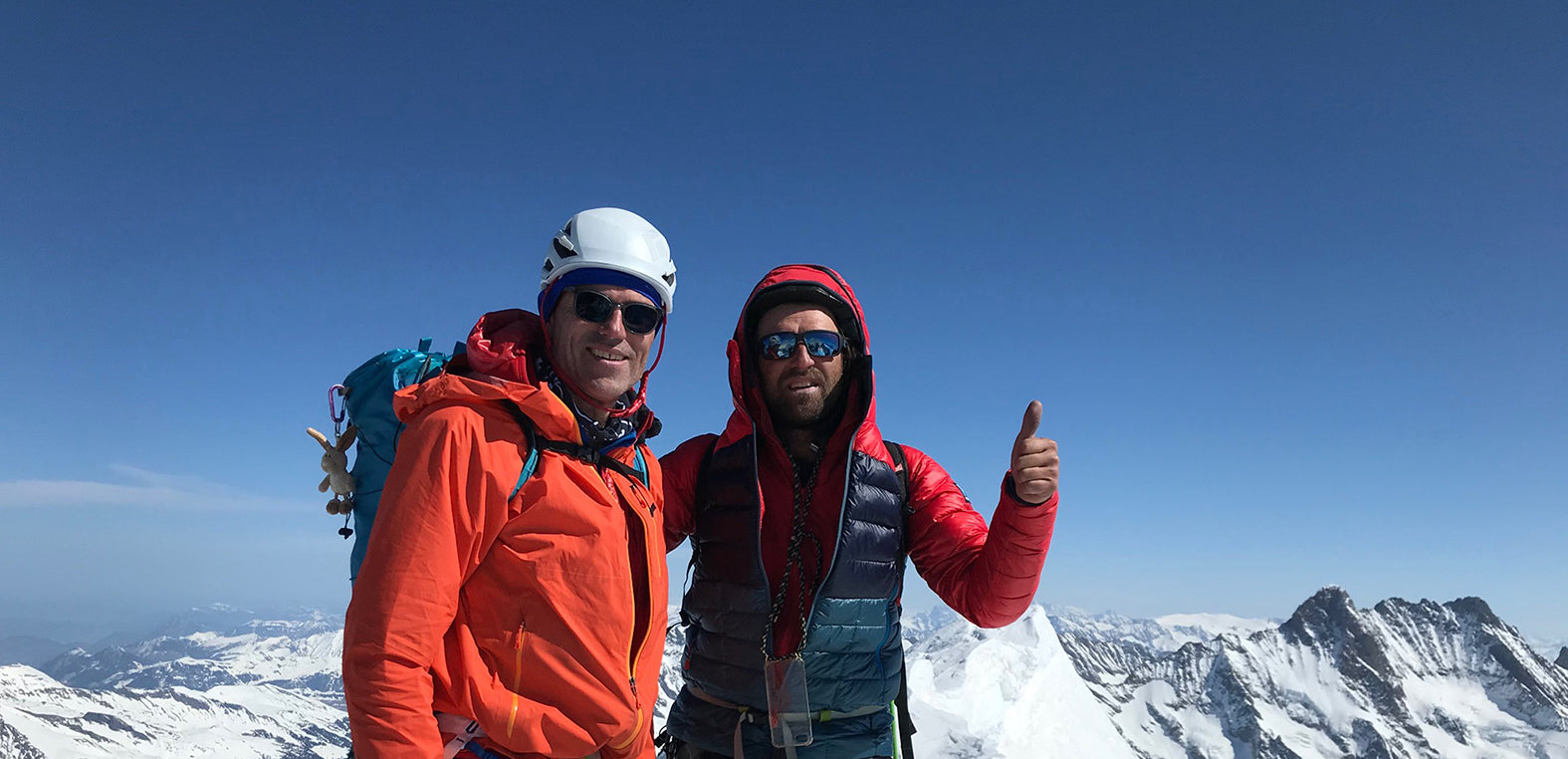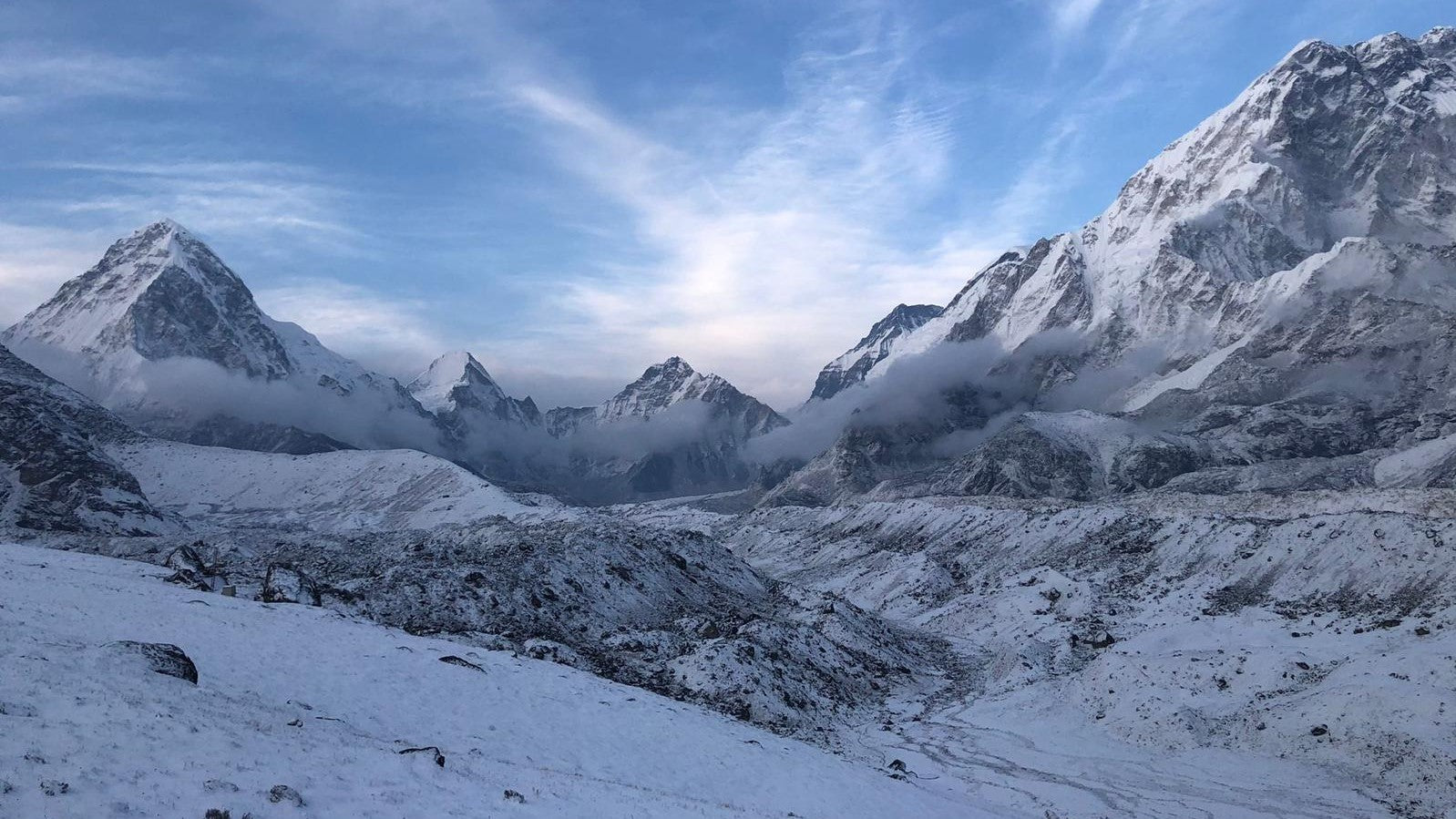
Coleridge and the first sport climb in history by Marina Morpurgo
Published on 7/05/2021
On a Saturday morning in August 1802, the poet Samuel Taylor Coleridge exits from Greta Hall - the great house in Keswick in the Lake District - with a backpack, which we would more properly refer to as a bundle, containing the following basic necessities and comfort: tea, sugar, a shirt, a scarf, two pairs of socks, a nightcap, a piece of oilcloth, an inkwell, half a dozen pens, note paper, and a verse book by the German poet Heinrich Voss. He plans to undertake what today we would call an exploratory trekking, and to cross the wildest areas of a region that with its dramatic landscapes has already won the attention of poets and writers.
He returns home nine days later - a real Himalayan-style expedition - and is greeted very badly by Mrs. Coleridge, who scolds him harshly for the tattered clothes and pitiful shoes, and she is not at all impressed by her husband's mountaineering prowess, who not only recorded the first official ascent of Mount Scafell, which - with its only 978 meters - is still the second peak in Great Britain and the first in England, but above all he became the protagonist, even if not intentionally, of what is considered the first sport climbing in history. Alone and without a rope, he descended along a series of treacherous ledges and vertical walls (known today as Broad Stand) which in the following centuries will become one of the black beasts of the local mountain rescue.

This remarkable achievement doesn’t make Mrs. Coleridge forget that her husband, deaf to her own screams and those of a certain Mary (probably an housekeeper), has seized the broom destined for the kitchen to make an alpenstock, after having torn off the twigs, left scattered on the floor (he himself confesses it). In the wrath of Sara Coleridge, who is also known for her sweet character and for being good-looking, probably plays a role the fact that along the way the poet writes very detailed letters to her great love, who is called Sara, but it is not that Sara he married but Sara Hutchinson, sister-in-law of the other romantic poet and naturalist William Wordsworth.
But let's go back to Coleridge's adventure, that looking at the impressive photos of the descent slope from the top of Scafell to the Mickledore ridge, appears to us as a very dangerous result of poetic ecstasy combined with an excess of confidence in his skills as an explorer: thanks to the letters to his beloved Sara, written along the way, and to the excerpts from the diary, we can literally follow him step by step, from excitement to anguish, then back to excitement and relief.

Coleridge is a formidable walker, like his friend and colleague Wordsworth: people who effortlessly hold up thirty miles a day. But definitely as a climber he is naive, and even a little crazy, and for him the troubles begin on August 5th, when he reaches the top of Scafell Pike, where he finds shelter on a flat rock: the sky in the direction of the Irish Sea has turned black, the wind blows, and the poet has nothing to eat, but what is worse under the rock on which he has settled down to write and rest a frightening precipice opens up. He is accompanied by a solitary sheep, perched on a ledge.
Coleridge is excited, ecstatic, and when he resumes his journey he is up to no good - he admits it himself, defining his attitude as a "criminal for a family man": "When I judge that the time has come to go down a mountain, I am too sure of myself and too lazy to look around and wander around and look for a passing trail or some other sign that the way is safe. As soon as you can get off, I go, relying on luck. "
And so, the poet ventures along the route that is now called Broad Stand. At first, he slides down without difficulty, the side is steep but not rocky, but then the vertical and smooth cliff begin. They are not very high, at least at the beginning, and so Coleridge grabs the edge with his hands and drops to the ledge below. The wall is followed by others, one after another: the poet begins to be exhausted, trembles, no longer controls his arms and legs. On one of the ledges he meets a dead sheep, and realizes that the poor beast, which was stuck on the rock, has died trying to do the same thing he is doing.
He realizes the existence of one of the laws of climbing: that you may not be able to descend from where you climbed up, and vice versa. If the law of gravity has allowed him to slide down, the vertical walls of slimy rock will not allow him to retrace his steps, so he is forced to continue, until he reaches the crux of the descent, a wall higher than the others, it is more than three meters, and the ledge below is so slender that the poet is certain that if he lets himself fall he would tip backwards and end up in the void, dying. At that point he lays down on his back, surrounded by repulsive walls, under a stormy sky, and here he falls into a kind of poetic trance: I'm calm, God! I am blessed, even though I don't know how to get off or how to get back up! The soul swims in the air like a flight of starlings!
When he gets up though, looking around he sees that on his left a crack opens in the rock, he looks out and understands that by slipping inside he will be able to descend without danger, protected by the walls of that passage in the chimney which today is called Fat Man's Agony. And so, he passes, even though he is not like a twig, but a fairly plump man: when he comes out, safe and sound and out of difficulties, he realizes that his chest is covered with red wheals, a probable reaction to superhuman fatigue (and in the meantime, he retrieves the house broom, which he had thrown down to have his hands free).
He still has to walk a lot, and deal with thunders and downpours before he gets to Eskdale, where he finds shelter on a farm, but he is now so excited that he would like to have the strength and health to carry on for a full month.
It’s August 6th, he will return home to Greta Hall on August 9th.

The description of the most literary, thoughtless and studied ravanage in the history of the Lake District ends with a notation on the state of the poet's clothes, who now no longer possesses anything that is not patched on his knees, elbows and back: but he cannot buy new ones at least until Christmas.
P.S. = Today the Broad Stand is crossed by people in a rope team, with helmets.

Marina Morpurgo, after working as a journalist became a literary translator from English and author of history books for schools. She has published fiction and non-fiction for children with Feltrinelli, and short novels and stories with the Astoria publishing house. The latest fiction book "È solo un cane (dicono)” was re-released in extended edition in 2020.
She loves fresh snow, dogs, ice cream, and granite slabs, while she hates traverses and anything that is overhanging.
Portrait © Gli Sfacciati
On a Saturday morning in August 1802, the poet Samuel Taylor Coleridge exits from Greta Hall - the great house in Keswick in the Lake District - with a backpack, which we would more properly refer to as a bundle, containing the following basic necessities and comfort: tea, sugar, a shirt, a scarf, two pairs of socks, a nightcap, a piece of oilcloth, an inkwell, half a dozen pens, note paper, and a verse book by the German poet Heinrich Voss. He plans to undertake what today we would call an exploratory trekking, and to cross the wildest areas of a region that with its dramatic landscapes has already won the attention of poets and writers.
He returns home nine days later - a real Himalayan-style expedition - and is greeted very badly by Mrs. Coleridge, who scolds him harshly for the tattered clothes and pitiful shoes, and she is not at all impressed by her husband's mountaineering prowess, who not only recorded the first official ascent of Mount Scafell, which - with its only 978 meters - is still the second peak in Great Britain and the first in England, but above all he became the protagonist, even if not intentionally, of what is considered the first sport climbing in history. Alone and without a rope, he descended along a series of treacherous ledges and vertical walls (known today as Broad Stand) which in the following centuries will become one of the black beasts of the local mountain rescue.

This remarkable achievement doesn’t make Mrs. Coleridge forget that her husband, deaf to her own screams and those of a certain Mary (probably an housekeeper), has seized the broom destined for the kitchen to make an alpenstock, after having torn off the twigs, left scattered on the floor (he himself confesses it). In the wrath of Sara Coleridge, who is also known for her sweet character and for being good-looking, probably plays a role the fact that along the way the poet writes very detailed letters to her great love, who is called Sara, but it is not that Sara he married but Sara Hutchinson, sister-in-law of the other romantic poet and naturalist William Wordsworth.
But let's go back to Coleridge's adventure, that looking at the impressive photos of the descent slope from the top of Scafell to the Mickledore ridge, appears to us as a very dangerous result of poetic ecstasy combined with an excess of confidence in his skills as an explorer: thanks to the letters to his beloved Sara, written along the way, and to the excerpts from the diary, we can literally follow him step by step, from excitement to anguish, then back to excitement and relief.

Coleridge is a formidable walker, like his friend and colleague Wordsworth: people who effortlessly hold up thirty miles a day. But definitely as a climber he is naive, and even a little crazy, and for him the troubles begin on August 5th, when he reaches the top of Scafell Pike, where he finds shelter on a flat rock: the sky in the direction of the Irish Sea has turned black, the wind blows, and the poet has nothing to eat, but what is worse under the rock on which he has settled down to write and rest a frightening precipice opens up. He is accompanied by a solitary sheep, perched on a ledge.
Coleridge is excited, ecstatic, and when he resumes his journey he is up to no good - he admits it himself, defining his attitude as a "criminal for a family man": "When I judge that the time has come to go down a mountain, I am too sure of myself and too lazy to look around and wander around and look for a passing trail or some other sign that the way is safe. As soon as you can get off, I go, relying on luck. "
And so, the poet ventures along the route that is now called Broad Stand. At first, he slides down without difficulty, the side is steep but not rocky, but then the vertical and smooth cliff begin. They are not very high, at least at the beginning, and so Coleridge grabs the edge with his hands and drops to the ledge below. The wall is followed by others, one after another: the poet begins to be exhausted, trembles, no longer controls his arms and legs. On one of the ledges he meets a dead sheep, and realizes that the poor beast, which was stuck on the rock, has died trying to do the same thing he is doing.
He realizes the existence of one of the laws of climbing: that you may not be able to descend from where you climbed up, and vice versa. If the law of gravity has allowed him to slide down, the vertical walls of slimy rock will not allow him to retrace his steps, so he is forced to continue, until he reaches the crux of the descent, a wall higher than the others, it is more than three meters, and the ledge below is so slender that the poet is certain that if he lets himself fall he would tip backwards and end up in the void, dying. At that point he lays down on his back, surrounded by repulsive walls, under a stormy sky, and here he falls into a kind of poetic trance: I'm calm, God! I am blessed, even though I don't know how to get off or how to get back up! The soul swims in the air like a flight of starlings!
When he gets up though, looking around he sees that on his left a crack opens in the rock, he looks out and understands that by slipping inside he will be able to descend without danger, protected by the walls of that passage in the chimney which today is called Fat Man's Agony. And so, he passes, even though he is not like a twig, but a fairly plump man: when he comes out, safe and sound and out of difficulties, he realizes that his chest is covered with red wheals, a probable reaction to superhuman fatigue (and in the meantime, he retrieves the house broom, which he had thrown down to have his hands free).
He still has to walk a lot, and deal with thunders and downpours before he gets to Eskdale, where he finds shelter on a farm, but he is now so excited that he would like to have the strength and health to carry on for a full month.
It’s August 6th, he will return home to Greta Hall on August 9th.

The description of the most literary, thoughtless and studied ravanage in the history of the Lake District ends with a notation on the state of the poet's clothes, who now no longer possesses anything that is not patched on his knees, elbows and back: but he cannot buy new ones at least until Christmas.
P.S. = Today the Broad Stand is crossed by people in a rope team, with helmets.

Marina Morpurgo, after working as a journalist became a literary translator from English and author of history books for schools. She has published fiction and non-fiction for children with Feltrinelli, and short novels and stories with the Astoria publishing house. The latest fiction book "È solo un cane (dicono)” was re-released in extended edition in 2020.
She loves fresh snow, dogs, ice cream, and granite slabs, while she hates traverses and anything that is overhanging.
Portrait © Gli Sfacciati


